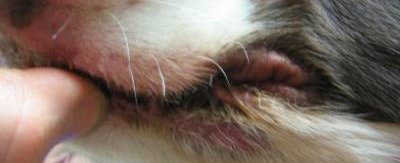Why Does my Golden Retriever Stink?
If you find this information useful, please spread the word by sharing this on Facebook with your friends or Tweeting this article.
Click here to Follow Dr. Marie on Twitter or here to Become a Facebook Fan.
Golden Retrievers are wonderful dogs, but often they can have a bad odor. Here are some possible reasons for your Golden's doggy smell:
Ear Infection:

Golden Retrievers can often be prone to ear infections. You can usually recognize an ear infection by seeing redness, debris and an odor in the ear. Quite often one ear will look much worse than the other. Ear infections can be caused by yeast, bacteria or a combination of the two. A yeast infection is usually very stinky. These types of infections almost always need to be treated with medication prescribed by your veterinarian.
If your Golden Retriever is getting ear infections often you may want to ask your veterinarian about the possibility of an underlying condition such as allergies or hypothyroidism.
Anal Glands:

A dog's anal glands, located at about 4 and 8 o'clock below the dog's anus can occasionally emit a strong fishy smell. If you are noticing an occasional odor then this may be the source. If so, it would be great to have your vet fully express your dog's anal glands. However, if the glands are smelly all of the time it may be that there is an infection present.
Yeast Skin Infection

Yeast infections in dogs are almost always very itchy. The most common area to see yeast infections are in the armpits and the groin of a dog. The skin in these areas will look greasy, thickened (almost like elephant skin) and often the pigment will be darker. Many times a yeast infection will need to be treated with oral antifungal medication. However, some of them will respond to Malacetic spray, wipes or shampoo.
Often dogs who have a yeast infection will have an underlying problem such as allergies or hypothyroidism.
Dental Problems:

Dental disease can cause some serious odor issues in dogs. If your dog has tartar on his teeth then there is a buildup of bacteria, and this can really smell. If you are seeing this in your dog's mouth then a dental cleaning under anesthetic is by far the best thing you can do!
Lip Fold Pyoderma

Some dogs can get a skin infection on the sides of their lower lip which can be quite smelly. These are usually quite itchy as well. Most of these dogs will need a course of oral antibiotics in order for this to clear up. It also helps to wipe your dog's mouth with a baby wipe after each meal.
Perivulvar Dermatitis

Some dogs have a very large skin fold on either side of their vulva. This skin fold can often grow bacteria. A dog with a peri-vulvar skin infection will usually be licking at her genital area a lot. You will often see brown saliva staining around the vulva.
Again, if the condition is quite severe the dog may need antibiotics, but if it is mild, wiping the folds out with a baby wipe a few times per week will really help to prevent an infection.
Bacterial Skin Infection (Pyoderma)

It is really common for Golden Retrievers to get a skin infection. Often we don't know the cause of a skin infection in a dog. We do tend to see more of them though in dogs who like to swim. Skin infections can often be stinky and itchy. If a Golden Retriever is getting repeated skin infections it may be worthwhile to ask your vet to test for hypothyroidism. Most skin infections need to be treated with 2-8 weeks of oral antibiotics.
Leave a comment below!
(Dr. Marie does not answer questions via the comments section, though!)
Dr. Marie was quick to respond and thorough in suggesting treatment for my cat. I am so thankful- I have been so worried about my cat. Now I have additional options to discuss with my vet.
The service was incredibly fast and the vet's suggestions were right on target. This was incredibly helpful given that none of the vets in my area, mine now included, will take off hours calls now.
 Dr. Marie is a veterinarian who practices in a busy animal hospital in Ottawa, Ontario. She created Ask A Vet Question as a resource for good, accurate veterinary advice online. Dr. Marie treats dogs, cats, hamsters, guinea pigs, and rats. She has been a vet since 1999.
Dr. Marie is a veterinarian who practices in a busy animal hospital in Ottawa, Ontario. She created Ask A Vet Question as a resource for good, accurate veterinary advice online. Dr. Marie treats dogs, cats, hamsters, guinea pigs, and rats. She has been a vet since 1999.
Is an online vet visit just as good as a trip to your veterinarian? No! But, many times, asking an online veterinarian a question can help save you money. While Dr. Marie can't officially diagnose your pet or prescribe medications, she can often advise you on whether a vet visit is necessary. You can also ask Dr. Marie for a second opinion on your pet's condition.












